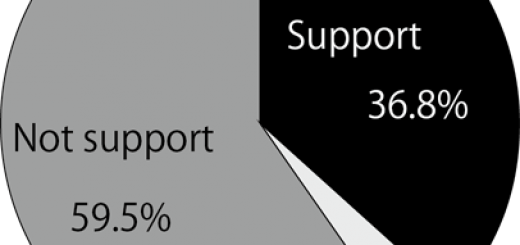GX Bundled Bill: Attempts to Revive Nuclear Power Becoming More Obvious, Laws to be Equivocal
By Ban Hideyuki (CNIC Co-Director)
The period for submitting public comments on basic policies for implementing the Green Transformation (GX) to the GX Implementation Council, the Nuclear Regulation Authority (NRA) and other organizations has ended, and the results are beginning to be released. According to the Cabinet Office, they had received 3,303 comments on “Basic Policies for GX Implementation.” News reports have it that many of these were opposed to nuclear power. The GX Implementation Council released the public comments it had received while simultaneously submitting the basic policies for approval by the Cabinet with slight revisions. Moreover, according to the minutes of the NRA’s meetings, of the 2,016 public comments they had received, it was announced that 1,749 were “considered to be opinions.” None of the comments welcomed the new developments. Many of the comments were opposed or inchoate. Audio recordings of meetings of the Japan Atomic Energy Commission (JAEC) reveal that they had received about 3,000 public comments. We at Citizens Nuclear Information Center (CNIC) called for people to submit public comments, and the response in terms of number of comments was greater than at any time before.
Clever Ways of Bundling Bills
In response to the above, a number of revisions to various laws were bundled together and presented to the Diet. These revisions will not be voted on one-by-one, but all together in one go. It’s a clever way of going about this. Since this portends to be a big turning point in nuclear power policy—reverting to nuclear power—wouldn’t it be proper to take time to discuss each proposed revision thoroughly and vote on each of them separately?
According to The Denki Shimbun, the Cabinet-decided bills have been bundled into “a draft law (GX Decarbonized Power Act) that would amend parts of laws such as the Electric Utility Industry Act, establishing an electric supply system in order to realize a decarbonized society.” The laws to be revised are (1) the Electric Utilities Industry Act, (2) the Renewable Energy Special Measures Act, (3) the Atomic Energy Basic Act, (4) the Nuclear Reactor Regulation Act and (5) the Spent Nuclear Fuel Reprocessing Act. Here, I will give a detailed overview of (1) and (4).
Revision of the Electric Utilities Industry Act
(1) and (4) are related to each other. The provision on period of operation stipulated in (4), the Nuclear Reactor Regulation Act, is to be deleted, and moved to (1), the Electric Utilities Industry Act. The framework of this revision of the Electric Utilities Industry Act is that the period of operation will be 40 years as a rule and maximum 60 years. To exceed the 40 year rule, it will be necessary to gain approval from the Minister of Economy, Trade and Industry (METI).
Naturally, conditions for approval are that the permission for establishing the facilities has not been revoked and that there have been no penalties imposed for violations of regulations, but in addition, they are to include “contributing to the securing of a stable supply of electric power while promoting use of the electric utility providers for realization of a decarbonized society.”
As a condition for permission to apply for an extension, this can be taken as a matter of course, but what it amounts to is positioning nuclear power as an essential and important power source for providing a stable source of electricity. If this happens, conversely, we have doubts if it would be permissible not to extend periods of operation. And if they are not extended, would there not be pressure to replace (rebuild) the reactors?
In the case of operation extending past 60 years, the extension can be for no longer than the period during which the reactor was idled. Here, the definition of the period of idling includes a) periods of idling to respond to changes in the screening and disposition standards of the Nuclear Reactor Regulation Act, b) periods of idling in cases of revocation of permission or receipt of orders to halt operation or utilization due to violations of regulations under the Nuclear Reactor Regulation Act, which were subsequently withdrawn due to objections to those measures, c) periods of idling under administrative guidance, and d) periods of idling in cases where an order of provisional disposition led to the idling, but was subsequently rescinded. We can say that these conditions for restoring periods of operation would be very advantageous to nuclear plant operators. In the case of a), considering the screening during those periods, the time taken for such screening does not necessarily reflect issues the regulators are having, but may be the responsibility of the nuclear plant operator in some cases. For example, the Japan Atomic Power Co. (JAPC) was caught rewriting geological data for its Tsuruga Unit 2 reactor without permission. It would be unacceptable for them to be able to recover the period during which that reactor was consequently idled for the subsequent screenings. Also, in the case of c), wouldn’t there be more cases in which METI, who oversees the nuclear power industry, avoids imposing administrative penalties on nuclear power companies for mismanagement, letting them off with simple administrative guidance?
Note that from the point of view of the responsibility of the government and business operators and their promotion of the use of nuclear power, the revisions of the Atomic Energy Basic Act are also likely to extend the operating period, but no bill has been indicated to that effect thus far.
Outline of Revisions of the Reactor Regulation Act
Without responding to opposing views in the public comments in a sincere manner, the NRA pointed to its Overview of Safety Regulations for Aging Nuclear Reactors at its meeting on February 8.
According to the overview, in cases where operation has exceeded 30 years, a “long-term facility management plan” (tentative term) must be developed and approved by the NRA within a period not to exceed 10 years. For further extensions, the same procedure is repeated. Approval is similarly needed for changes made during the approved period (though not required for minor changes). Methods of assessing degradation and the forthcoming results are noted in the long-term facility management plan, along with measures for controlling degradation. The standards for the plan’s approval are that it must not interfere with disaster prevention and it must comply with technical standards. If the plan fails to qualify, the necessary measures for it to pass can be ordered. If the facilities are operated in violation of this, their approval can be rescinded or their operation can be halted for up to one year. Measures are underway to transition to this new system. These transitional measures will take about two years to implement, and the business operators are aware of this already.
According to the NRA’s discussions so far, inspections will be performed according to the current technical standards until 60 years of operation have passed, but at this time there are no technical standards for operation past that, so they will be formulated in the future. There are no prospects, however, for establishing technical standards that can reliably evaluate and predict deterioration from aging and reflect new findings. The author submitted his own public comment, saying he thinks we should wait at least until the new technical standards have been established before we start talking about extending the operating period.
Of the five NRA committee members, Ishiwatari Akira expressed opposition to the bill, and his stance remained unchanged at the extraordinary meeting held on February 13. When adopting it with a majority vote, NRA Chairman Yamanaka Shinsuke shrugged “It can’t be helped because there is a deadline.” The term “overreach” applies to this insult upon the injury of the law’s revisions.
The reason that Ishiwatari gave for opposing it was “The NRA’s mission is to protect people and the environment on the basis of scientific and technical knowledge,” but the revisions under consideration, “Do not make changes in the law based on any kind of new scientific or technical knowledge…but in particular they eliminate any mention of periods of operation from the law, so they cannot be called revisions for the sake of safety.” Mentioning the bill’s prolongation of inspections, which will be diligent but, unfortunately, take a lot of time, he brought up a second reason for opposing it, which was that “a bill under which the longer the time these inspections take, the further the operating periods can be extended…ensures us a future where superannuated reactors are operating, which is contradictory to the purpose.”
According to news reports, Ishiwatari also gave vent to his views at the February 13 meeting regarding the governmental policy of excluding periods during which reactors are idled for inspections from their operating period. “As an inspector,” he said, “I find it outrageous that safety inspections will lead to further extension of the already prolonged lives of nuclear power plants.” In addition, NRA member Sugiyama Tomoyuki pointed out, “We have rushed our discussions of this because we have to meet a deadline. We are an independent institution, and we should have taken time to discuss this,” and NRA member Ban Nobuhiko said, “It is institutional arguments that are taking precedence. It pains me that how to regulate operation past 60 years will only be an afterthought.” Though both of these NRA members voted in favor of the bill, it does not necessarily mean that the approval was wholehearted.
Other Revisions
The Spent Nuclear Fuel Reprocessing Act will also be affected, with one revision in the Electric Utilities Industry Act making reserve funds for the decommissioning of conventional nuclear reactors available to fund reprocessing, and another revision changing the name of the Nuclear Reprocessing Organization of Japan (NURO), as the organization managing the funds, to the “organization to promote spent fuel reprocessing and decommissioning” (tentative translation).
Many of the public comments submitted were against a reversion to nuclear power. There has been no effort to reflect these views in the bill, which was passed in nearly its original form. A fierce debate has begun in the Diet. Forcing this bill though against the opposition would be unforgivable.


